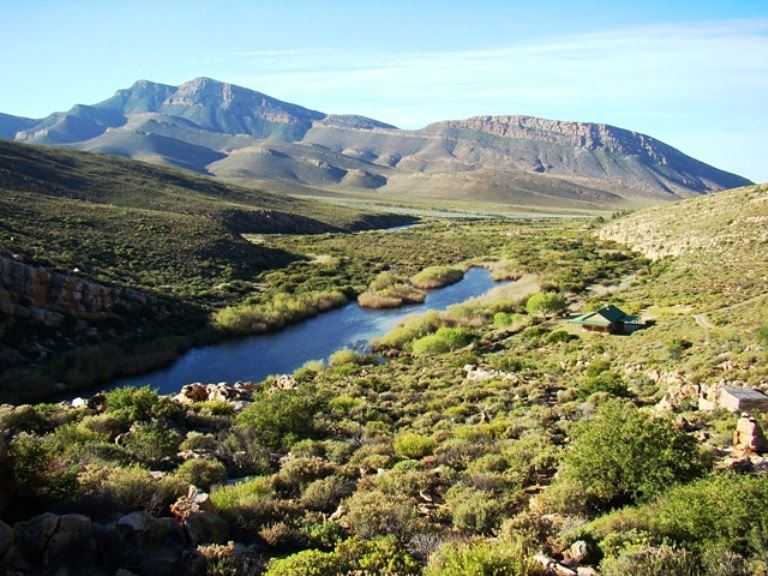The spectacular mountains of Cederberg (Cederberg Wilderness Area) north of Cape Town, along the Olifants River, extend between Clanwilliam, centre of the Rooibos industry, and Citrusdal, known for its citrus production and natural springs of hot water. They enclose some of the most beautiful scenery of the cape: 83,000 hectares of wilderness that features amazing sandstone formations eroded by rain and wind, rock art (San rock art), rugged mountains and clear streams! The hiking trails are numerous and are suitable for novices as well as for seasoned walkers.
Hiking permits are obtained locally in Algeria or Dwarsivier but during school holidays, it is better to book in advance because the number of hikers is limited...
Another way to enjoy the area is to observe the sky and the stars (sky of great purity) from the Cederberg Astronomical Observatory (open on Saturday evenings, except full moon night).
Finally, the Cederberg Mountains gave their name to the Cederberg estate, the highest vineyard in South Africa.
Including the southernmost point of the African continent and subject to the hot and cold currents of the Atlantic and Indian Oceans, the Western Cape province is very different from the rest of the country. The many assets of the city and its region should seduce you: geographical setting, cosmopolitan atmosphere, gastronomy, world class wines, culture, history, temperate climate (Mediterranean), whales.
Advice:
- The period to visit Cape Town extends from October to May, however the best month is February with less frequentation and a summer time still almost guaranteed...
Note: avoid December if you can (peak tourist season)
- Allow at least 3 nights in Cape Town to enjoy the city, the beautiful peninsula and the Wine Route
- Combine Cape Town with the charming Garden Route (minimum 3 additional nights)
South Africa, the 'rainbow' nation.
South Africa is so diverse you feel like you are visiting several countries in one trip!
With grandiose and various landscapes (mountains, « bush », beaches, forests, plains, desert), a pleasant climate in all seasons, an abundant and diversified fauna and flora including the “Big Five”, a population with the most composite ethnic groups, South Africa accumulates important natural wealth. Also note among its assets: quality of the hotel sector, services, road network, means of transport, rich and varied gastronomy, excellent wines, favourable exchange rates, 21 national parks and many private reserves, a multitude of activity throughout the country…
When to go?
South Africa has this peculiarity of presenting a wide variety of climates: Mediterranean, subtropical or temperate depending on the region with a high rate of sunshine everywhere (watch out for sunburn!)
South Africa can be visited all year round with more favourable periods depending on interests:
-
June, July and August (South African winter) for animals and therefore preferably the North of the country.
-
September and October: best times for flowers (Namaqualand) but very good for game drives as well.
-
From November to March (South African summer): best time to enjoy the South and East of the country, beaches of the Cape and the Indian Ocean. The Garden Route is particularly appreciated in February: the weather is nice; the temperature of the water is pleasant.
-
April and May: very pleasant autumn with always nice days in Cape Town and the resumption of the animal season.
Formalities:
The passport must include two blank pages and still be valid for 30 days after the expected date of exit from South Africa.
French nationals are exempted from prior visas. A 90-day residence permit will be issued at the border on entry into South African territory.
For other nationalities, inquire on a case-by-case basis with the competent authorities of their country of origin.
For any minor child: a multilingual extract of birth certificate (or an unabridged birth certificate translated into English - certified translation) is required to enter and leave South Africa (in the case of a child traveling with his 2 parents). Please consult the official sites for more information about all the requested documents according to your case.
Health:
No vaccinations are required for entry into South Africa. However, it is advisable to check the updating of your usual reminders and vaccinations as for any country.
Anti-malarial treatment is recommended (see your doctor).
Currency:
The Rand is the official currency of South Africa (symbol: ZAR). Credit cards are accepted everywhere and distributors are easily available for cash withdrawal. Travellers’ checks in euros are also accepted in banks and some hotels.
